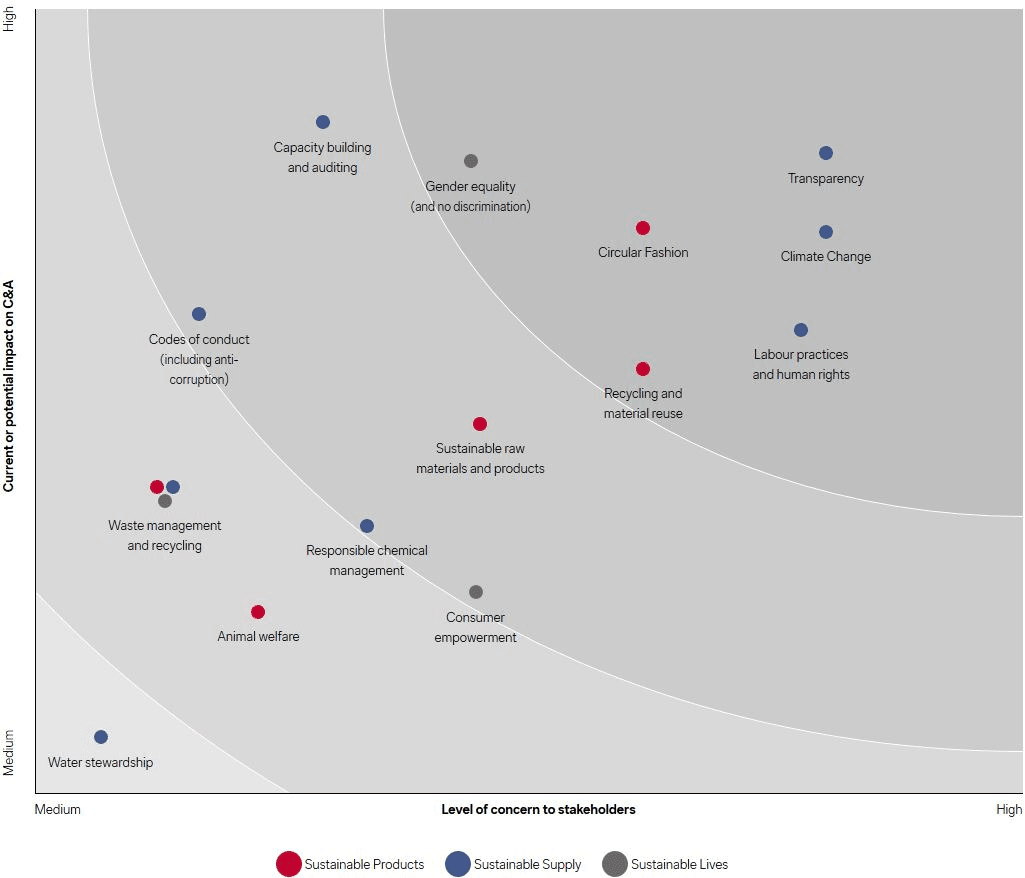And why you should start right now!

In recent years, creating a sustainable business has become the norm rather than the exception.
80% of the top companies worldwide are now reporting on sustainability, including their impact and their goals.
Yet, when it comes to creating a sustainability strategy, many of the companies I come across don’t know where to start. Sustainability is a broad term that encompasses many diverse social and environmental topics.
Our advice; start with a Materiality Assessment, right now!
What is a Materiality Assessment?
A Materiality Assessment is a way of identifying, assessing and prioritising what sustainability topics your stakeholders find most important, compared with the impact those topics have on your company. It’s a survey that can give you measurable outcomes like this simple matrix below.
Source: C&A Global Sustainability Report
So why should your company take the time and effort to identify stakeholders, survey and engage with them?
1. Do your research
When conducting a survey with your stakeholders to understand which topics are important to them, it is essential to do your own research first. No one likes a list of 40 topics to choose from and it won’t give you the results you are looking for. You need to research what sustainability topics are being prioritised globally and within your industry. A fashion company has different battles to fight than a financial service company. By doing a Materiality Assessment, you will narrow down your company’s sustainability priorities to global and industry-specific topics.
2. Identify sustainability priorities
Despite the draw of a ‘hot’ topic globally, it may not be something your company should focus on. The results of your assessment could reveal alternative topics that are more important to your stakeholders. Finding out what is right for your audience, helps your company thrive as you will identify the issues that could have the biggest impact on your business.
3. Engaging external stakeholders
Since entering a new century, the shareholder view has changed to a stakeholder view. All stakeholders should and want to be heard. Conducting a survey with your target audiences, will give them a platform to communicate their thoughts. They will also get a better understanding of where your priorities are and will see that you are taking steps towards being a more sustainable company, providing an excellent reputation opportunity.
4. Involve your employees
A survey will give you a lot of quantitative data which provides a good overview of which topics to prioritise. However, what it doesn’t tell you is how to do this. In a recent client workshop on the Materiality Assessment, we identified a lot of insightful contextual information to help the company accelerate their sustainability efforts. One of which was educating all employees about the identified sustainability topics. The result: all employees felt engaged, motivated and ready to embed sustainability into their core business activities.
5. Get it right first time
Time and resources are always a constraint. So you want to make sure you put your time and effort in the things that actually matter. I have often seen a sustainability strategy that has been put in place and resources allocated, but then the Materiality Assessment tells them it is not in fact a priority at all. Avoiding this misstep is simple. We all want to get it right first time so starting with a Materiality Assessment is what every company should do. Now!
Materiality thinking for your B Corp journey
Learn the benefits behind this crucial tool, how it fits with your B Corp journey and pick up some practical tips for getting started…
How Seismic can help make the most of materiality for your business
We partner with organisations to make sure they take materiality into account in their ESG strategy. We can help you get started, create a materiality matrix with the issues that are most material to your company, and deliver insights and recommendations. Get in touch.



